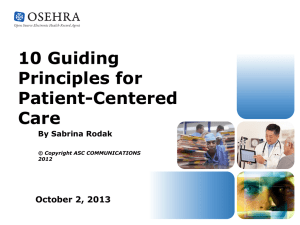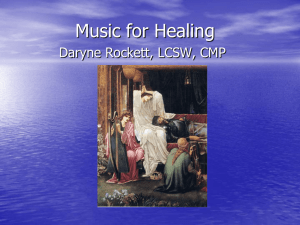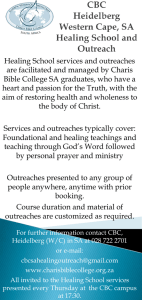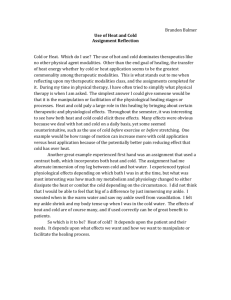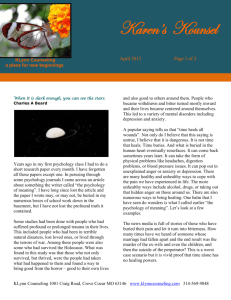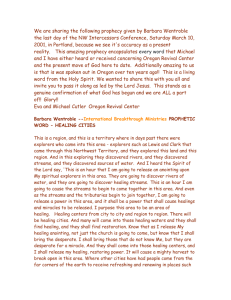Healing-Crisis
advertisement
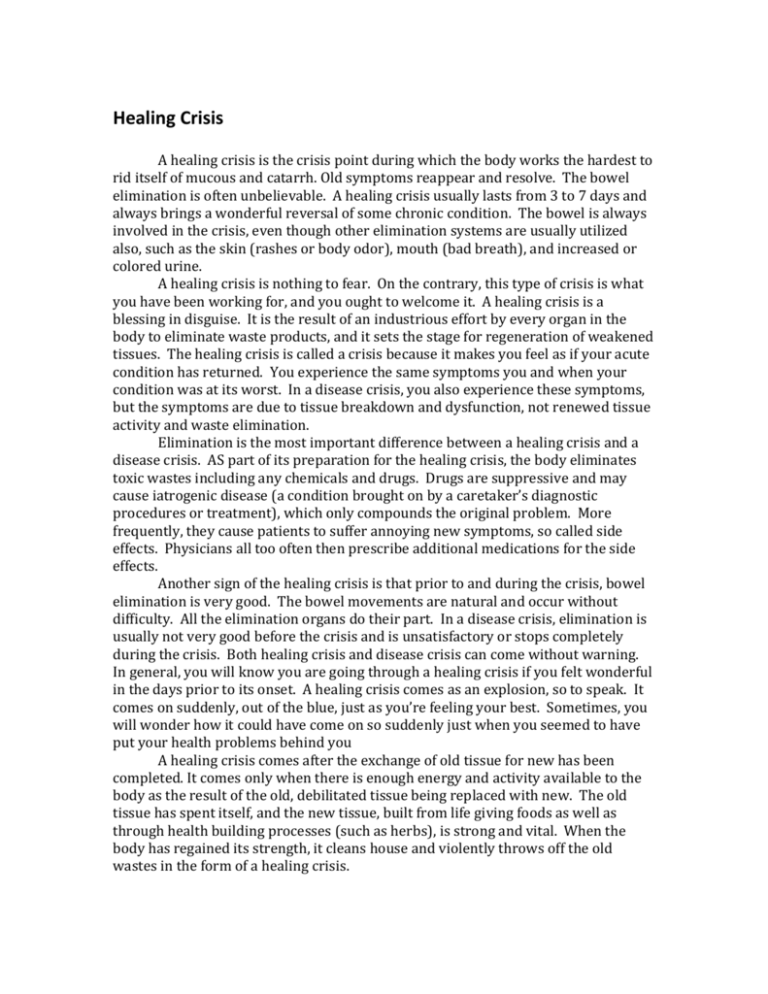
Healing Crisis A healing crisis is the crisis point during which the body works the hardest to rid itself of mucous and catarrh. Old symptoms reappear and resolve. The bowel elimination is often unbelievable. A healing crisis usually lasts from 3 to 7 days and always brings a wonderful reversal of some chronic condition. The bowel is always involved in the crisis, even though other elimination systems are usually utilized also, such as the skin (rashes or body odor), mouth (bad breath), and increased or colored urine. A healing crisis is nothing to fear. On the contrary, this type of crisis is what you have been working for, and you ought to welcome it. A healing crisis is a blessing in disguise. It is the result of an industrious effort by every organ in the body to eliminate waste products, and it sets the stage for regeneration of weakened tissues. The healing crisis is called a crisis because it makes you feel as if your acute condition has returned. You experience the same symptoms you and when your condition was at its worst. In a disease crisis, you also experience these symptoms, but the symptoms are due to tissue breakdown and dysfunction, not renewed tissue activity and waste elimination. Elimination is the most important difference between a healing crisis and a disease crisis. AS part of its preparation for the healing crisis, the body eliminates toxic wastes including any chemicals and drugs. Drugs are suppressive and may cause iatrogenic disease (a condition brought on by a caretaker’s diagnostic procedures or treatment), which only compounds the original problem. More frequently, they cause patients to suffer annoying new symptoms, so called side effects. Physicians all too often then prescribe additional medications for the side effects. Another sign of the healing crisis is that prior to and during the crisis, bowel elimination is very good. The bowel movements are natural and occur without difficulty. All the elimination organs do their part. In a disease crisis, elimination is usually not very good before the crisis and is unsatisfactory or stops completely during the crisis. Both healing crisis and disease crisis can come without warning. In general, you will know you are going through a healing crisis if you felt wonderful in the days prior to its onset. A healing crisis comes as an explosion, so to speak. It comes on suddenly, out of the blue, just as you’re feeling your best. Sometimes, you will wonder how it could have come on so suddenly just when you seemed to have put your health problems behind you A healing crisis comes after the exchange of old tissue for new has been completed. It comes only when there is enough energy and activity available to the body as the result of the old, debilitated tissue being replaced with new. The old tissue has spent itself, and the new tissue, built from life giving foods as well as through health building processes (such as herbs), is strong and vital. When the body has regained its strength, it cleans house and violently throws off the old wastes in the form of a healing crisis. To achieve regeneration of tissue, the body must pass through 3 stages. These 3 stages are the elimination, the transitional, and the building stages. The healing crisis usually occurs near the end of the transitional stage, which is when the new tissue has matured sufficiently to take on the function of a more perfect body. The healing crisis starts with a slight discomfort, which quickly increases in severity until the point of complete expulsion is reached. During a healing crisis, a person must “wait out” the crisis while continuing to follow a health building path. Yielding to the temptation to resort to medications during the acute period will serve only to suppress the symptoms. The person will then have to again go through the crisis at a later time in order to be well. Following he acute stage of the healing crisis, the discomfort diminishes. If the person’s energy is low, the crisis sometimes lasts for a week or more. People whose energy is too low should work to rebuild their health and energy until their bodies can manifest a crisis, basically increase vitality before starting a detox program or cleanse. Be assured that nature will not allow a healing crisis to take place before its appointed time. When doing any type of cleanse or rebuilding regime, it is very important to drink a lot of water! Water flushes to toxins out of the body as you cleanse. Tea, coffee, and sodas do not count as water. Lack of enough water will cause excess bloating, gas, and other stomach discomforts, including pain. Some of the healing crisis symptoms are flu-like symptoms, fever, rashes, nausea, stomach pain and bloating, headaches, body odor, bad breath, and excess sweating. All of these are natural methods in which the body eliminates toxins. We are taught to take a pill to suppress these symptoms, when in reality, we are just driving these conditions deeper. It may be hard to embrace the idea of feeling worse before you feel better, but try to remember that the bad stuff is coming out and celebrate! I have noticed that healing crisis tend to follow a weak link in the system. For instance, if you sweat more than average, sweating will probably be your outlet. If you tend to have rashes and skin disorders, you may break out with large rashes that are red or irritated. If you tend to have a nervous stomach or constipation, your discomfort will be in the stomach region more than anywhere else. Above all, do not take any suppressive medications. This includes cold medicine, aspirin, etc. Sometimes it is hard to believe that flu-like symptoms can be caused by something like a liver cleanse, and you may want to grab a cold medicine to help get you through it. The liver controls your hormones, glands, and mucous congestion, and a lot more. If you take an antihistamine because of the excess mucous, you are only driving the mucous back into the body and negating the effects of the liver cleanse. You will always emerge from a healing crisis feeling better, with more energy. Many times, other seemingly non-related symptoms disappear. This is very common with colon, kidney and liver cleanses. Sometimes, depending on the condition and toxicity of a particular organ, more than one round of cleansing may be necessary to decongest that particular organ.

